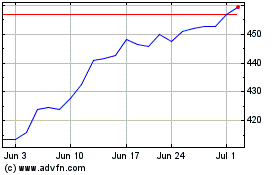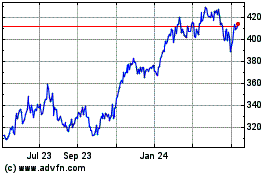Microsoft Co-Founder Paul Allen Dies at 65 -- Update
October 15 2018 - 8:24PM
Dow Jones News
By Jay Greene
Paul Allen, the billionaire co-founder of Microsoft Corp. who
went on to invest his fortune in ventures from the Seattle Seahawks
to brain research to the arts, died Monday, two weeks after
revealing the return of a cancer he had received treatment for
years ago . He was 65 years old.
Mr. Allen's company, Vulcan Inc., announced his death.
Mr. Allen rose to fame as a pioneer in personal computing. In
1975, he joined with his high-school friend Bill Gates to found
Microsoft, a software company that in the ensuing decades went on
to dominate the PC industry.
In a story that has become part of Silicon Valley lore, Mr.
Allen raced to share with Mr. Gates an article about a computer
called the MITS Altair 8800 that appeared in the January 1975 issue
of Popular Electronics magazine. Mr. Gates, a student at Harvard
University at the time, dropped out to start the new software
company with his friend.
"Paul Allen's contributions to our company, our industry and to
our community are indispensable," Satya Nadella, Microsoft's
current chief executive, wrote in a post on the company's LinkedIn
service. "As co-founder of Microsoft, in his own quiet and
persistent way, he created magical products, experiences and
institutions, and in doing so, he changed the world."
Mr. Allen's post-Microsoft life included a range of
philanthropic work through Vulcan, including support for the
protection of endangered species, research into climate change and
efforts to combat epidemics. He also invested in sports franchises
close to his home base, including the National Football League's
Seahawks and the National Basketball Association's Portland Trail
Blazers.
Mr. Allen was Microsoft's chief technology officer when he left
in 1983 after being diagnosed with Hodgkin's disease. As
Microsoft's shares grew, Mr. Allen, like Mr. Gates, became a
billionaire. He used that fortune to build his own business empire
investing in cable, entertainment, real estate and science.
And he became a philanthropist as well, giving away more than $2
billion. Some of those gifts, through The Paul G. Allen
Philanthropies, including funds addressing climate change
challenges, Zika and other pandemics, and homelessness. Mr. Allen
had joined Mr. Gates and Berkshire Hathaway Inc. investor Warren
Buffett in a pledge to give away more than half their fortunes. His
fortune is estimated at about $20 billion, according to Forbes.
Mr. Allen revealed two weeks ago that non-Hodgkin's lymphoma,
which he had fought in 2009 had returned. He said he had begun
treatment, and that his doctors were optimistic.
"My brother was a remarkable individual on every level," his
sister and former Vulcan executive Jody Allen said in a written
statement. "While most knew Paul Allen as a technologist and
philanthropist, for us he was a much loved brother and uncle, and
an exceptional friend."
Mr. Allen was fascinated by science, and created the Allen
Institute for Brain Science, to help better understand how the
brain works, as well as the Allen Institute for Cell Science, to
study complex cells in order to advance biomedical research. He
also funded the Allen Institute for Artificial Intelligence.
Write to Jay Greene at Jay.Greene@wsj.com
(END) Dow Jones Newswires
October 15, 2018 20:09 ET (00:09 GMT)
Copyright (c) 2018 Dow Jones & Company, Inc.
Microsoft (NASDAQ:MSFT)
Historical Stock Chart
From Mar 2024 to Apr 2024

Microsoft (NASDAQ:MSFT)
Historical Stock Chart
From Apr 2023 to Apr 2024
